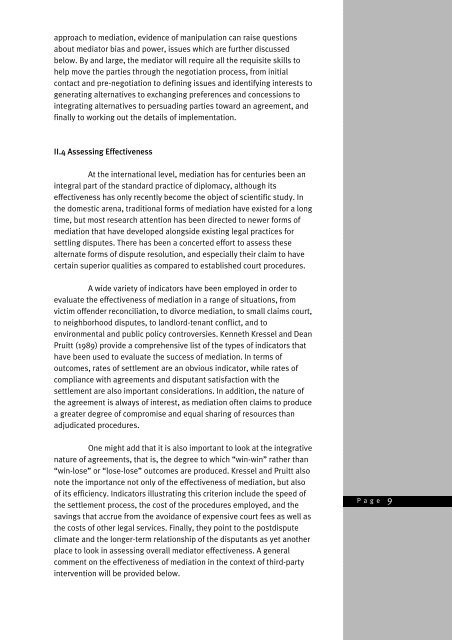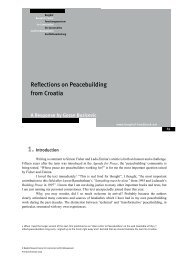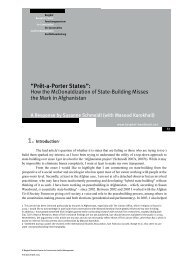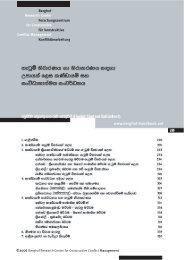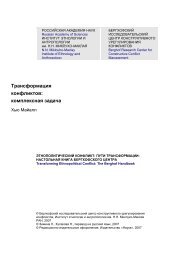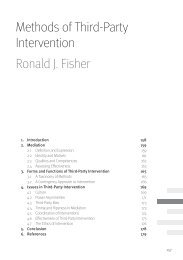Methods of Third-Party Intervention - Berghof Handbook for Conflict ...
Methods of Third-Party Intervention - Berghof Handbook for Conflict ...
Methods of Third-Party Intervention - Berghof Handbook for Conflict ...
You also want an ePaper? Increase the reach of your titles
YUMPU automatically turns print PDFs into web optimized ePapers that Google loves.
approach to mediation, evidence <strong>of</strong> manipulation can raise questions<br />
about mediator bias and power, issues which are further discussed<br />
below. By and large, the mediator will require all the requisite skills to<br />
help move the parties through the negotiation process, from initial<br />
contact and pre-negotiation to defining issues and identifying interests to<br />
generating alternatives to exchanging preferences and concessions to<br />
integrating alternatives to persuading parties toward an agreement, and<br />
finally to working out the details <strong>of</strong> implementation.<br />
II.4 Assessing Effectiveness<br />
At the international level, mediation has <strong>for</strong> centuries been an<br />
integral part <strong>of</strong> the standard practice <strong>of</strong> diplomacy, although its<br />
effectiveness has only recently become the object <strong>of</strong> scientific study. In<br />
the domestic arena, traditional <strong>for</strong>ms <strong>of</strong> mediation have existed <strong>for</strong> a long<br />
time, but most research attention has been directed to newer <strong>for</strong>ms <strong>of</strong><br />
mediation that have developed alongside existing legal practices <strong>for</strong><br />
settling disputes. There has been a concerted ef<strong>for</strong>t to assess these<br />
alternate <strong>for</strong>ms <strong>of</strong> dispute resolution, and especially their claim to have<br />
certain superior qualities as compared to established court procedures.<br />
A wide variety <strong>of</strong> indicators have been employed in order to<br />
evaluate the effectiveness <strong>of</strong> mediation in a range <strong>of</strong> situations, from<br />
victim <strong>of</strong>fender reconciliation, to divorce mediation, to small claims court,<br />
to neighborhood disputes, to landlord-tenant conflict, and to<br />
environmental and public policy controversies. Kenneth Kressel and Dean<br />
Pruitt (1989) provide a comprehensive list <strong>of</strong> the types <strong>of</strong> indicators that<br />
have been used to evaluate the success <strong>of</strong> mediation. In terms <strong>of</strong><br />
outcomes, rates <strong>of</strong> settlement are an obvious indicator, while rates <strong>of</strong><br />
compliance with agreements and disputant satisfaction with the<br />
settlement are also important considerations. In addition, the nature <strong>of</strong><br />
the agreement is always <strong>of</strong> interest, as mediation <strong>of</strong>ten claims to produce<br />
a greater degree <strong>of</strong> compromise and equal sharing <strong>of</strong> resources than<br />
adjudicated procedures.<br />
One might add that it is also important to look at the integrative<br />
nature <strong>of</strong> agreements, that is, the degree to which “win-win” rather than<br />
“win-lose” or “lose-lose” outcomes are produced. Kressel and Pruitt also<br />
note the importance not only <strong>of</strong> the effectiveness <strong>of</strong> mediation, but also<br />
<strong>of</strong> its efficiency. Indicators illustrating this criterion include the speed <strong>of</strong><br />
the settlement process, the cost <strong>of</strong> the procedures employed, and the<br />
savings that accrue from the avoidance <strong>of</strong> expensive court fees as well as<br />
the costs <strong>of</strong> other legal services. Finally, they point to the postdispute<br />
climate and the longer-term relationship <strong>of</strong> the disputants as yet another<br />
place to look in assessing overall mediator effectiveness. A general<br />
comment on the effectiveness <strong>of</strong> mediation in the context <strong>of</strong> third-party<br />
intervention will be provided below.<br />
Page 9


